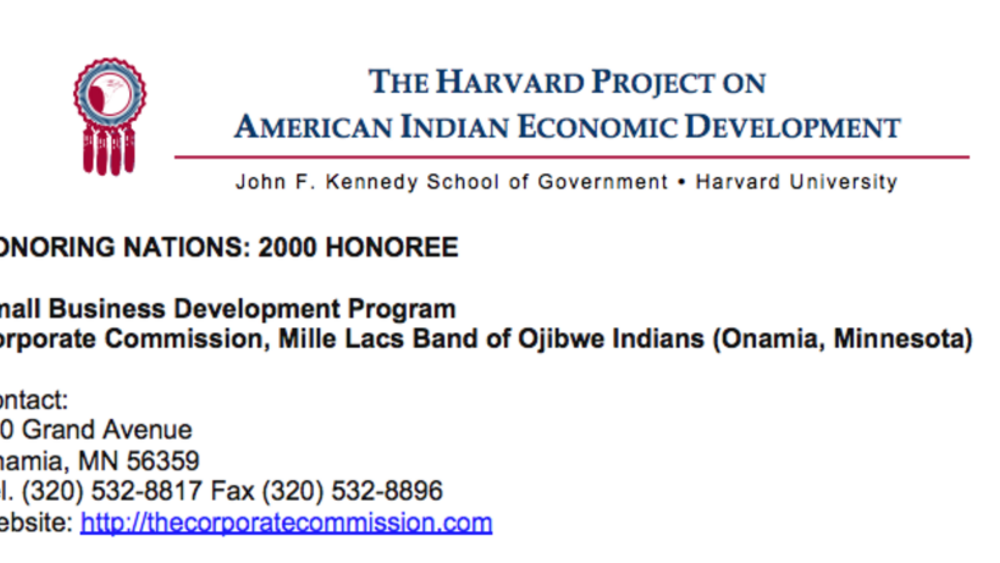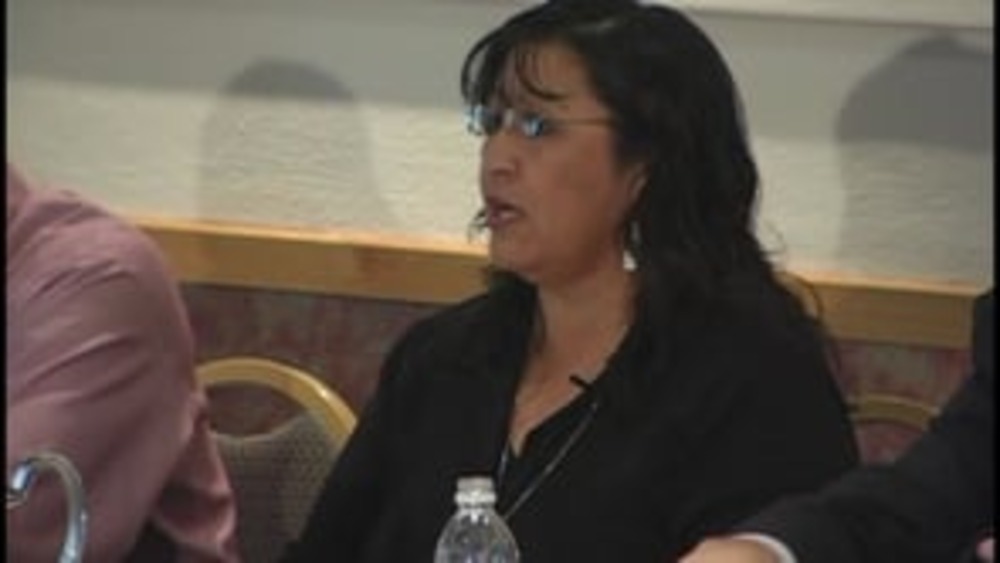Harvard Project on American Indian Economic Development Co-Director Joseph P. Kalt discusses the types of corporations that Native nations can charter and what they should consider when deciding which type to choose.
Additional Information
Kalt, Joseph P. "The Practical Issues of Business Development - Some Things to Consider: Legal Structure." Building and Sustaining Tribal Enterprises seminar. Native Nations Institute for Leadership, Management, and Policy, Udall Center for Studies in Public Policy, University of Arizona. Tucson, Arizona. March 29, 2007. Presentation.
Transcript
"They've asked me to just say a few words here to kick off this session and talk about the kinds of entities and structures that we're seeing used out there and that are working or not working in Indian Country. And I guess it's our gig at the Harvard Project and at NNI is to try to focus on what's working, but we often start with what's not working. And I want to describe two -- I won't even name the two tribes I'm about to say something about -- but it's sort of a lesson in what not to do. And here's the way they're going about economic development and development of tribal enterprises. They have an economic development committee. The economic development committee is just appointed, it's unpaid, appointed by the tribal council, has its roots in the old U.S. Department of Commerce Economic Development Administration grants. They ran out of the grant money, but they sort of kept the committee and the committee's job is to, number one, go out and find us some businesses to invest in. Number two, bring those investors to us, the tribal council, and sort of vet them and tell us whether we should invest in them. And this sort of strategy, and then the end result if they're successful, in one case one tribe actually has three enterprises, all of which are losing money rapidly and the tribe is trying to get out of [them]. If they're successful, this economic development committee, in finding a business, as if you're sort of, I don't know, looking for a four-leaf clover or something. If you're successful what happens is the tribal council basically buys a business, owns it, as if they were buying pencils for the office. It has no separate legal structure, it's just a tribal enterprise and the tribal council will appoint -- as if it were another grants program -- an enterprise manager. And again and again and again this, which is really, you can hear the way I'm telling the story, a holdover from the old grantsmanship days where getting an enterprise was just like landing a grant. You just sort of found one and then appointed someone to be the head of the grant or head of the enterprise. And time and again across Indian Country, this has been a recipe for failure.
You see at the other extreme -- and Diane Enos came in and did it, the other extreme -- which is to build the legal structures to protect yourselves, to put in place -- I thought she said it beautifully -- it's not that you're taking politics out of these enterprises, it's that you're structuring them within a rule of law. And that's critical here. There is a huge job to be performed in the management of tribal enterprises by the tribal politicians. Someone needs to sit there and filter and make those decisions. Is this the direction we want to go? Is this the strategic step we want to take with our nation's assets? But it's not the tribal council's job to go figure out who gets the contract for the pencils in the office and I've seen...it wasn't pencils in the office, it was the printing of envelopes, bring down a tribal chairman. The guy got himself impeached over the envelope contract. That is, the day-to-day meddling in the business end. The same goes for tribal administration. So there's a critical job to be played by the tribal politicians and that is to set in place the legal structures and to make the big strategic choices. Do we want -- you hear at Salt River in a beautiful way -- do we want the interior of this reservation developed or not? Or are we going to set up a nine-mile corridor out on the edge of Scottsdale? 'Oh, that makes more sense to us.' Those are the critical strategic decisions that you want your elected officials to make. We often get associated with this phrase 'get politics out of business.' Yes and no. Politics properly by the rules, setting the overall directions and it should properly stay out of the decision who gets the contracts to print the name 'Salt River Sand and Gravel' on the side of this pen. So what kind of structures are we seeing out there?
The first structure is what I mentioned, it's a failing structure, unfortunately -- many tribes are learning -- and that's just go buy a business and run it like it's a grant. The alternatives to that, there's three main families that I'll touch on briefly here. There are three main structures that we see tribes using. One is the federally chartered corporation, Section 17 typically. These are corporations chartered by the federal government and really chartered under essentially the laws of the United States Congress. These Section 17 corporations give the tribe a legal entity chartered by the federal government. There isn't an explicit waiver of sovereign immunity and indeed these entities can be subject to suit. But, you can't get at the core tribal assets of tribal land or other assets not being held outside of that entity. In fact you can hear Diane talking a little bit about this, they're not talking these so-called Section 17 federal corporations. In other words, if that corporation owns some pickup trucks, yeah, those could be taken from you in a lawsuit over these Section 17 federally chartered corporations. But the Section 17 corporation does not let that car dealer or whoever it might be get at core tribal assets away from and outside of this entity. Why do this? It's sort of weird in an era of sovereignty and either you follow the ones that Joan and others and I do, we keep saying, 'Look tribes, run it yourself, run it yourself, run it yourself.'
Why do a Section 17 federal? Well, I was sort of surprised. We had one very interesting case out there, the Blackfeet in Montana have a corporation called Siyeh Corporation, S-I-Y-E-H, it's like the name. And it's very interesting, you ask Blackfeet, 'Why'd you go have the feds set up your corporation?' And they said, 'Look, to us it was an act of sovereignty and a little bit of desperation.' Many of you have heard about some of the Blackfeet Enterprises, Blackfeet Writing Instruments, the pencils and so forth that we used to get in grade school and so forth, Blackfeet National Bank. It had trouble, it had trouble finding that balance between politics that sets direction versus politics that constitutes meddling in the daily affairs. And they said, as a community, 'Look, we're having problems with our political systems and we're a little bit unstable, but at least as a community we can agree we'd like to get these enterprises in a way that they're insulated in terms of day-to-day meddling.' And so it's very interesting. It shocked me cause I've been Mr. Pro-Sovereignty. This is a case in which a tribe said, 'As a sovereign, we're going to ask another sovereign to charter this corporation to try to give us some time to work on our own political system over here at the same time we're trying to get some enterprises going.' So it's an interesting strategy, and one that as I say it sort of shocked me because we've been so hard on this horse of charter them yourselves, set them up yourselves, etc. So there are some cases apparently where a sovereign nation, in this case the Blackfeet, might make a choice to go with a federally chartered corporation.
The next layer down, of course, are state-chartered corporations, and for many tribes this is the quick way to get a corporation chartered. The owner of the enterprise is the tribe, but you get a corporation chartered under the laws of either Delaware, where everyone does the national corporations, or perhaps your own state. Under these state-chartered corporations typically, and I'm not a lawyer so don't take me as legal advice, but typically these state-chartered corporations do not provide for sovereign immunity but they essentially build a shell around the assets of the enterprise so that what can be sued is the enterprise, not the entire tribe. More and more tribes are moving to now a new model, after the federally chartered, the state chartered, more and more tribes are moving to a new model, which is tribally chartered corporations. And to us I think this represents the wave of the present and the future indeed, to Mike Taylor who has been very instrumental actually in developing a lot of this and that's partly what Salt River is doing. Under tribally chartered corporations, they typically involve a five-step, at least a five-step process. First, the tribe will pass a law of corporations establishing the rules, procedures, etc., under which tribes as an entity, individual tribal citizens, and even non-citizens can charter new businesses within the jurisdiction of the tribe. So just like here in the State of Arizona, if I want to go open a McDonald's or something I'll probably charter a corporation under the State of Arizona. More and more tribes are adopting the equivalent of the State of Arizona's laws of incorporation and they become Colville Tribe's laws of incorporations or Eastern Cherokee Tribe's laws of incorporation, and so forth. And that's critical because it sets down the framework, you've got to establish enterprises, but it's basically laying down all those rules, how board of directors will be created, what will their responsibilities be, what will their liabilities be, all these kinds of things.
The second layer that actually has to happen at the same time...Typically the law gets passed if you will and almost at the same time if not before tribes work on building up their own tribal court's capacities to handle business law. And so you find cases where tribes are simultaneously creating laws of incorporation and some tribes, for example, have begun to create a business court. So many tribal courts are buried as are everybody's courts with the family law cases, the juvenile cases, the drug cases, assault and so on and so forth that tribal judges just like the judges of Pima County are so often unschooled in and not ready for that really handling business law. And so you'll find tribes beginning to do things like create a tribal business court. Often it doesn't mean a whole lot other than we designate you as our business judge and we'll send you to some training, but at least you're trying to start that process of saying, 'We will adjudicate our own laws and our own laws of incorporation.'
After that there's a set of, a third, a next layer, third layer of laws. Those laws often deal with the business environment, adopting some version of a commercial code. It doesn't have to be the uniform commercial code of all, actually I think about 47 states are uniform now, but some version of laws that provide for garnishment, for the rules under 'if I need to repossess your truck, how long do I have to give you to repay?' and all of the... what are the procedures for taking you to tribal court and so forth so some form of a commercial code. In addition, as tribes create enterprises, either tribally owned or tribal member-owned corporations under their own laws, tribes find they need to do what most other governments in the world do, things like registration.
There's a very interesting case going on right now. Crow, in fact they may have done it this week, about to or just did. Crow sits there and they're trying to get some businesses going, they're going through everything I've just described, all these stages, and they look around and think, 'We need to register these corporations so they can go to court, people will know whose corporations they are.' They don't have the computer capacity right now and the record-keeping capacity. They're signing a memorandum of understanding with the State of Montana, Secretary of the State, not giving up any sovereignty, basically on a contract basis hiring the record-keeping services of the State of Montana, so that you can punch a button and call up, probably type in the word Crow, here comes all the Crow corporations. No jurisdiction at all, it's just purely the computerized record-keeping, which Crow recognizes that they need.
So there's the basic laws of incorporation, there's the strengthening of the tribal court around business law, there's then the laying in place the legal environment for businesses, the uniform codes, the recordings, etcetera. Then you get to the point of actually creating real enterprises, and we're talking enterprises, and I won't go into it today, others will and I think Joan in particular, but often this begins with the creation of a board of directors and a great deal of paperwork. It was fascinating, Diane carrying that big thick notebook that she showed you. There's a lot of paperwork that goes into just laying down, 'okay, here's how we're going to select members of the board. Here's how many can be from non-citizens of the tribe, how many citizens,' all these rules. 'What are the terms of office, terms for removal?' all of those things critical to have in place.
And then lastly once you've got the corporations created, then you're ready to actually begin to make investments. I went through this in order like this because so often I see tribes desperate...elected officials desperate for the ribbon cutting. That is for, I've got to show that I'm doing something, we've got a new business and often the cart gets way out ahead of the horse and you see tribes, 'Well, we'll buy a business and then later will pass the laws and we'll create a board of directors,' and so forth and so on and again and again and again without those structures that Diane Enos had in that notebook. That's where you see problems arise because there's no way then by which to say, 'Wait a minute, you didn't tell me you were going to wait six months to create a board and you promised me I could be on the board.' All of those problems arise without that laid in place, that infrastructure, the legal infrastructure prior to going out and buying a business. And so this has been a quick run-through, but those are the three models that we see, the federally chartered corporations, the state and the tribal. But you can't just do that, you've got to put that other infrastructure, your courts, the laws and so forth in place. So that's what we're seeing out in Indian Country, what's working."



